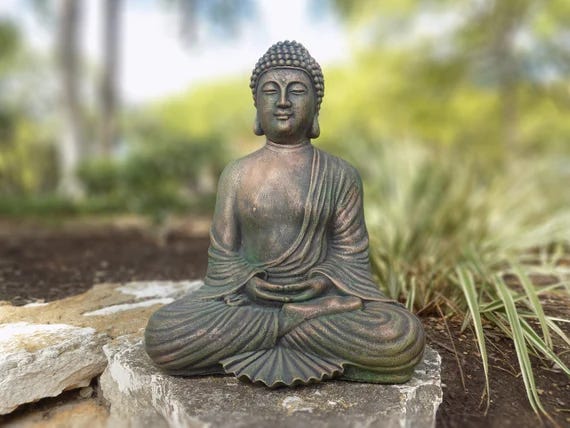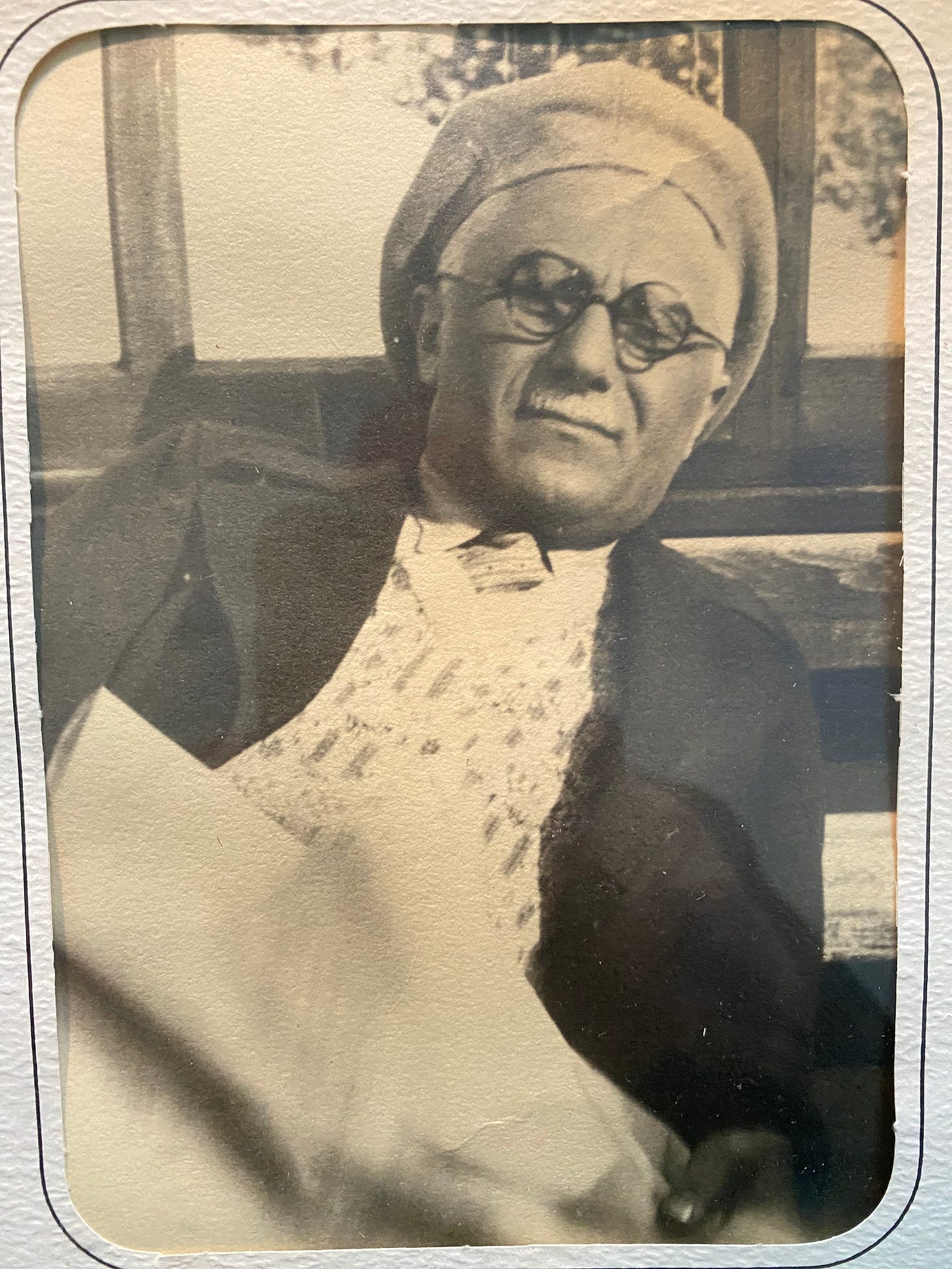The Endgame
Newsletter #73 - Emulate the Buddha
Toronto, July 21, 2024
Emulate the Buddha
How much should we rely on other people to help us as we age? The elderly (like me—I turned 80 two days ago) need all the help we can get. Old age can be terrifying.
Our needs increase as our abilities decrease. Who can we turn to? A young person, a grandchild, or the kid next door, will be happy to move a heavy box upstairs if we ask nicely. A good friend may pick up some groceries or take us to a medical appointment. A tech-savvy pal can explain how an Apple watch works. But who will help us figure out what the hell is happening in the world?
Proponents of self-reliance rush about issuing robust and self-righteous directives. They tell us, take responsibility, be independent, seize control. There are sinister subtexts to these anodyne admonitions. If you’re not fully independent, watch out. People only care about themselves. It’s best to make your own way and the devil take the hindmost. Furthermore, and most importantly, self-reliance is morally correct. It’s the right way to be. (Also, notice that pursuance of self-interest and rejection of altruism are convenient stablemates of self-reliance.)
There’s the opposite view: We depend on each other and must take responsibility for our fellow human beings. Advocates for this position also have a kit bag of platitudes. It takes a village. We are all in it together. No man is an island. Altruism, we are told, is important. Give me all your money and we’ll build a community garden. This opposite view also has sinister subtexts. If we don’t all work for the common good, catastrophe will ensue. If you’re selfish rather than selfless, not only are you a bad person, but you are also sealing your own miserable fate.
In their pure form these views are bunkum. Single-minded pursuit of radical self-reliance will turn you into a lunatic living in the woods eating squirrels and drinking from puddles of rainwater. Raw altruism will have similar consequences.
The ethical notion of the golden mean proposes a middle ground. It’s found in the writings of Aristotle (all virtues lie at a mean between extremes of deficiency and excess); of the Jewish philosopher Maimonides (the moderate path between extremes is the way of the Lord); in Buddhism (the Buddha decided that neither luxury or asceticism is correct and achieved enlightenment by adopting a middle path); and in Confucianism (zhongyong is an ideal of moderation, balance, and centredness).
As you age, emulate the Buddha. Don’t pursue total self-reliance. Don’t rely completely on the mercy of others. Find a middle path, exercising judgment case-by-case. Ask for help, but judiciously.
Which leaves the difficult question, who exactly do you ask for help when you need it? Family? That can be problematic (“All happy families are alike; each unhappy family is unhappy in its own way.”—Anna Karenina). Friends? (“I get by with a little help from my friends.” –Sgt. Pepper's Lonely Hearts Club Band). Strangers? (“I have always depended on the kindness of strangers.”—Blanche in A Streetcar Named Desire). Paid helpers (if you can afford such a luxury)? Choose judiciously and do not be surprised if you are disappointed.
My paternal grandfather, Volodya Slavouski, who was chased out of Russia in 1905, used to say, “everything in moderation” (this according to my father—my grandfather died before I was born). Volodya, who swam across the Dnipro River when he was on the run, got it right. Rely on yourself, but not too much. Seek help, but carefully. Emulate Volodya.
Some comments on Newsletter #72, “Looking in the Mirror”:
The irrepressible David Wolinsky writes: “The eighties aren’t at all frightening. I’m already at 83 and realize how nice it is to be in my 80s every morning as I walk on the Promenade, look up, and say good morning to the five dozen or so of my friends who didn’t manage to get this far.”
A thoughtful reader comments: “Until 4 years ago I was a beef cattle farmer doing the wild and strenuous tasks needed. Thought I could continue forever. Now the body changes/deteriorates faster than the mind comprehends. I'm 77, mother died at 93 - active and alert she sat down one day and never got up. Father died at 50 of war induced ailment. Life never stops being fragile and temporary.”
Another reader writes: “What am I so afraid of? This year I became sixty-five. Suddenly, I feel the pressure of the time I've wasted dwelling in regret. Oh dear. What have I done with my time? What time do I have left and what can I cram in? The career that never was? What should I hurry to be, so that I become something before I become nothing forever?”
From cousin Gerry: “Welcome to the club of 8. We were waiting for you. There are only a few rules in this club. The main rule is you must keep counting. The second rule is to know what you are counting. The third rule, and this one is designed specifically for you, is that you continue with the Endgame. It helps your fellow club members accept the issues that accompany the world of 8.”
And some earlier comments on Newsletter #71, “Walking”:
From a Winnipeg reader: “You've reminded me of Rachel Joyce's lovely Harold Fry, whose unlikely pilgrimage takes him 600 miles by foot from Kingsbridge to Berwick-Upon-Tweed, determined that his old friend Queen Hennessy will not die as long as he keeps walking.”
A loyal reader writes: “Inspired by the walking histories of two people I’ve long admired … Dickens and Arnold Toynbee … I recently decided to rediscover my favourite countries by walking across them. I did a few hundred km across the north coast of Spain last September and the same along the west coast of Portugal this Spring. Come September, starting on the day I turn 75, I’ll begin walking a 500 km stretch across Tuscany, Umbria and Lazio all the way to Rome. I’ve discovered belatedly but mercifully that walking is far more fun than working out in a gym.”
Another reader comments: “You might appreciate this quote from The Songlines by the great Bruce Chatwin, an inveterate walker in many lands: “The Bushmen, who walk distances across the Kalahari, have no idea of the soul's survival in another world. 'When we die, we die,' they say. 'The wind blows away our footprints, and that is the end of us.' Sluggish and sedentary peoples, such as the Ancient Egyptians – with their concept of an afterlife journey through the Field of Reeds – project on to the next world the journeys they failed to make in this one.””
And from Julian, my dear friend and severest critic: “The concept of you being a flaneur is a bit much. It carries an early Parisienne touch of a rogue slouching into a mistress’s lair. It doesn’t work, your hair isn’t sufficiently quaffed.”




On the other side, there's Barry Goldwater's "moderation in the pursuit of justice is no virtue..." But probably even he, when not being rhetorical for poliltical purposes, would probably have admitted that some balance between means and ends is required, both to achieve anything and just to get by.
I suspect that your friend Julian, in his perceptive comment on you as a flaneur, meant 'coiffed' rather than 'quaffed', though if he was relying on voice recognition software, a spell-checker would not have caught the difference...
Aristotle's advice of temperance in most matters is sensible. Mortimer Adler - the reader of Aristotle and perhaps most famous for writing How to Read a Book - drew a distinction between the "limited goods" of liberty and equality and the "unlimited" good of justice. There is a such thing as too much liberty and too much equality - we can have more than is good for us. But there's no such thing as too much justice. We should have as much liberty and as much equality as justice allows.